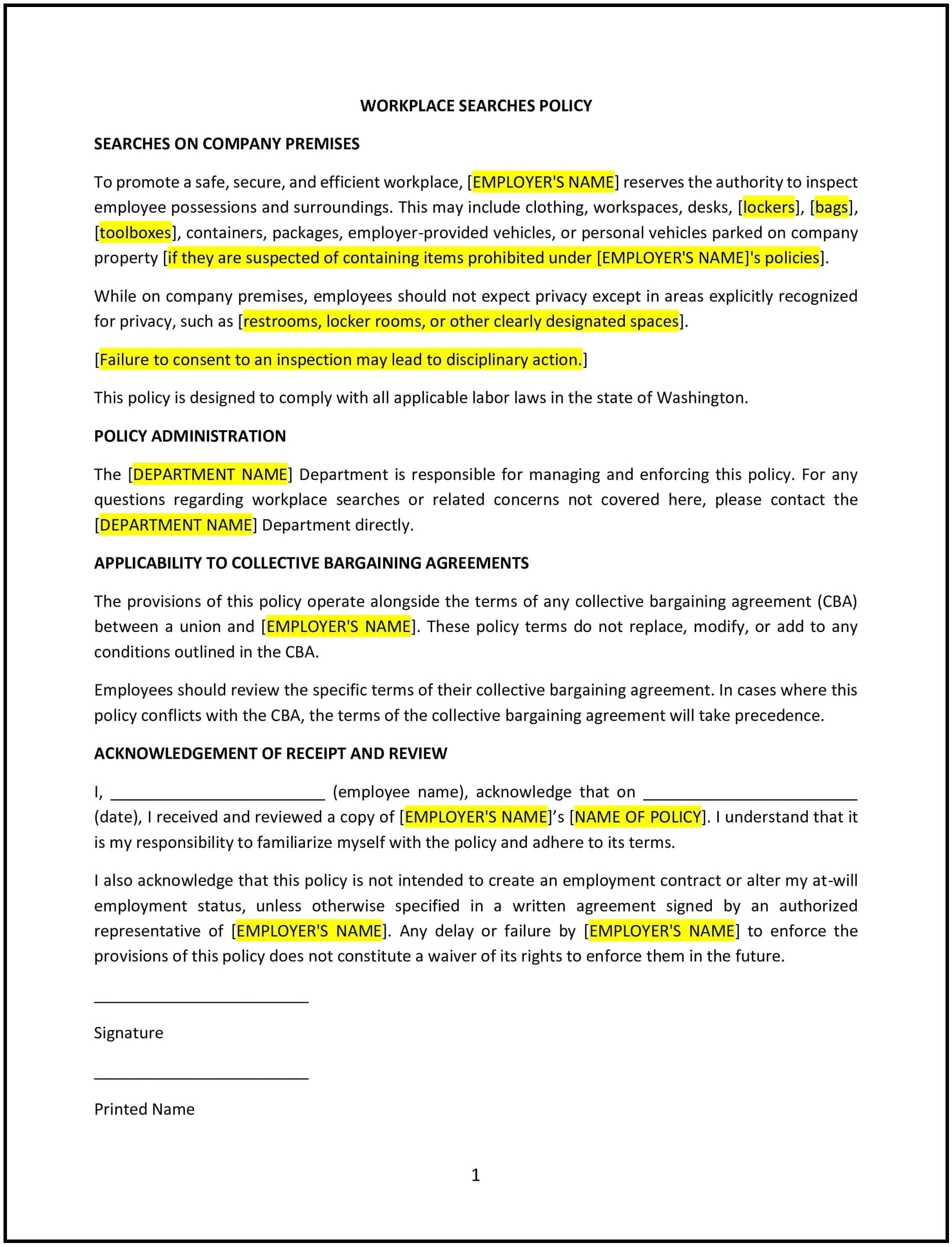Workplace searches policy (Washington): Free template
Got contracts to review? While you're here for policies, let Cobrief make contract review effortless—start your free review now.

Customize this template for free
This workplace searches policy is designed to help Washington businesses establish clear guidelines for conducting searches of employees, their belongings, or company property. The policy defines when and how searches may be conducted, the scope of the searches, and the rights of employees. It ensures that searches are conducted fairly and legally while maintaining a respectful and productive work environment. The policy also addresses privacy concerns and outlines the company’s responsibilities in accordance with Washington state laws.
By adopting this policy, businesses can reduce risks related to theft, misconduct, and safety concerns, while ensuring that employees’ rights are protected and that searches are conducted in a manner that respects personal privacy.
How to use this workplace searches policy (Washington)
- Define when searches are permissible: The policy should specify when and under what circumstances workplace searches will be conducted. This may include situations where there is suspicion of misconduct, theft, or safety risks. It should make clear that searches are not arbitrary and must be based on reasonable grounds.
- Outline the scope of searches: The policy should describe the scope of workplace searches, such as searches of personal belongings, lockers, desks, vehicles, or electronic devices. It should specify the areas that are subject to search and the conditions under which these searches will occur.
- Establish procedures for conducting searches: The policy should detail the procedures for conducting searches, including who will carry out the search, how the employee will be notified, and how privacy will be respected during the process. It should include provisions for having a witness present during the search to ensure fairness.
- Address employee consent and notification: The policy should explain whether employee consent is required before conducting a search and how employees will be notified of the search. It should specify that searches will only take place after reasonable notice, unless there is an emergency or urgent safety concern.
- Protect employee privacy: The policy should ensure that searches are conducted in a manner that minimizes the intrusion on employees’ privacy. It should address how personal information will be handled during a search and that any items unrelated to the reason for the search will be respected and returned.
- Specify consequences for refusal to cooperate: The policy should outline the consequences for employees who refuse to cooperate with a workplace search, which may include disciplinary action depending on the circumstances.
- Ensure compliance with Washington state laws: The policy should comply with Washington state laws regarding privacy rights and workplace searches, as well as federal regulations governing employee rights and the workplace. It should outline how the company will protect employee rights while conducting searches.
- Review and update regularly: Periodically review and update the policy to ensure it remains compliant with Washington state laws, federal regulations, and any changes in company operations. Regular updates will help ensure the policy stays relevant and effective.
Benefits of using this workplace searches policy (Washington)
This policy offers several benefits for Washington businesses:
- Enhances workplace security: By clearly defining when and how searches can occur, the policy helps prevent theft, misconduct, and other safety risks that could affect the workplace. It creates a safer environment for employees and the company.
- Reduces legal risks: A well-defined workplace searches policy helps businesses comply with Washington state laws and federal regulations, reducing the risk of lawsuits or claims of privacy violations.
- Promotes fairness: By establishing clear and consistent procedures for conducting searches, the policy ensures that employees are treated fairly and that searches are conducted transparently, without bias or discrimination.
- Protects employee rights: The policy emphasizes that employee privacy and rights will be respected during searches. This builds trust between the company and employees, reducing the likelihood of disputes or misunderstandings.
- Improves company reputation: A transparent and legally compliant search policy enhances the company’s reputation as a fair and responsible employer. It demonstrates the company’s commitment to maintaining a safe and respectful workplace.
- Prevents disruptions: By proactively addressing potential issues through the policy, businesses can prevent workplace disruptions caused by theft, misconduct, or safety concerns, thereby maintaining productivity and employee focus.
Tips for using this workplace searches policy (Washington)
- Communicate the policy clearly: Ensure that all employees are aware of the workplace searches policy and understand the company’s expectations regarding personal belongings, conduct, and the circumstances under which searches may be conducted. Include the policy in the employee handbook and review it during onboarding.
- Provide training to managers and supervisors: Offer training for managers and supervisors on how to handle searches fairly and respectfully. Ensure they understand the procedures outlined in the policy and how to apply them consistently.
- Handle searches with respect: Always treat employees’ personal belongings and privacy with respect during a search. Use searches as a tool to address specific concerns and ensure that employees understand the need for the search.
- Maintain a witness during searches: To ensure fairness and transparency, always have a second witness present during searches. This helps prevent disputes and protects both the company and employees from any misunderstandings.
- Monitor compliance: Periodically monitor how the policy is being applied in practice to ensure that searches are being conducted in accordance with company guidelines. Regularly assess whether any updates or adjustments to the policy are needed.
- Review and update regularly: Periodically review the policy to ensure it remains compliant with Washington state laws, federal regulations, and any changes in the company’s operations. Regular updates will help keep the policy relevant and effective.